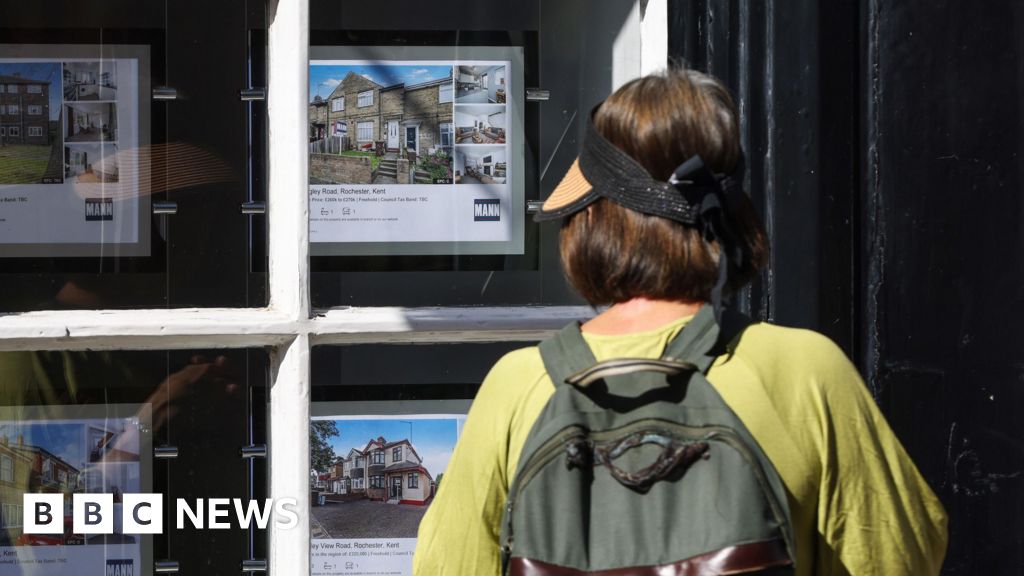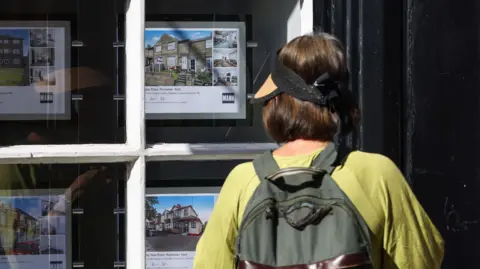Business
Conservatives announce £5,000 tax rebate for young home buyers

Kate WhannelPolitical reporter and
Georgia RobertsPolitical correspondent, Manchester
 Getty Images
Getty ImagesThe Conservatives will set out plans to “reward work” by giving young people a £5,000 tax rebate towards their first home when they get their first full-time job.
In his speech to the party’s conference in Manchester, shadow chancellor Mel Stride is expected to announce proposals for a “first-job bonus” that would divert National Insurance payments into a long-term savings account.
The party says the plans will be funded by cuts to public spending worth £47bn over five years in areas such as welfare, the civil service and the foreign aid budget.
In a speech on Monday, Sir Mel is expected to say that there is “no more pretending we can keep spending money we simply do not have”.
Proposals include stopping welfare claims for people with “low-level mental health problems” and reducing the number of civil servants by around 132,000 to bring it back to 2016 staffing levels – a pledge made under Boris Johnson.
Sir Mel will also say his party would reduce aid spending by £7bn, by reducing the budget to 0.1% of national income, from 0.5% currently.
The conference in Manchester marks almost one year since Kemi Badenoch was elected party leader.
In the last 12 months, the party has struggled to counter the political threat posed by Reform UK and suffered heavy defeats in this year’s local elections.
During their conference, which began on Sunday, the Conservatives are hoping to portray themselves as more competent and more credible – particularly on public spending – than their political rivals.
It comes as the Labour government has unveiled major housing market reform plans which will make sellers and estate agents legally required to provide more information about a property up front, in a bid to reduce the cost of moving.
The Conservatives say their £47bn target would be delivered over the lifetime of a five-year Parliament by saving:
- £23bn from the welfare bill
- £8bn by bringing civil servant numbers from 517,000 down to 2016 levels of 384,000
- £7bn from the overseas aid budget
- £3.5bn by ending the use of hotels to home asylum seekers
- £4bn by ensuring benefits and social housing are reserved for UK nationals
- £1.6bn by scrapping environmental policies, including cutting subsidies for heat pumps and electric vehicles.
Speaking to BBC Radio 4, Sir Mel said welfare savings could be delivered by reducing payments to those with “lower level mental health issues”, citing mild depression, anxiety, and attention deficit hyperactivity disorder (ADHD).
The Tories also want to review exemptions for the household benefit cap, limiting the VAT subsidy for Motability – which allows claimants to lease vehicles – and changing obligations for job-seekers.
He defended the party’s decision not to back a government attempt to cut nearly £5bn from the disability and health-related benefits bill.
Labour ministers, he added, had been “pulling a quick lever to make quick savings” whereas the Tories were interested in “fundamental reform”.
He also insisted the Tories’ policy of restricting foreign nationals’ access to disability and sickness benefits was backed by the public, adding that the Tories wanted British citizenship to “really mean something here”.
Those losing their benefits could try to find a better-paying job or work additional hours, he suggested, and would also “have an option to return to other parts of the world”.
Last year, the Office for Budget Responsibility forecast that total spending on health and disability benefits would rise from £64.7bn in 2023-24 to £100.7bn in 2029-30.
Earlier this year, Prime Minister Sir Keir Starmer said he would cut the UK’s aid budget from 0.5% of gross national income to 0.3% in 2027 in order to pay for an increase in defence spending.
The Conservatives say further reducing spending to 0.1% would save nearly £7bn.
Currently, a portion of the existing aid budget is used to pay for hotels to accommodate asylum seekers.
The Institute for Economic Affairs (IEA) think tank welcomed some of the proposals but warned the Conservatives not to ignore “elephant in the room” of age-related spending such as pensions.
Tom Clougherty, IEA executive director, said: “Ultimately, no political party is going to be able to balance the books only by cutting things their supporters don’t like.
“Without that, other cuts are likely to amount to running to stand still.”
The Conservatives have not committed to changing the triple lock, which guarantees that the state pension will go up each year in line with either inflation, wage increases or 2.5% – whichever is the highest.
Romilly Greenhill, chief executive of Bond, the network of international development organisations, said the proposed aid budget cuts were “reckless, short-sighted, and morally indefensible”.

Business
Ajit Jain: Warren Buffett’s trusted executive Ajit Jain buys apartment in Gurugram for Rs 85 crore – The Times of India

A 7,400 sq ft apartment at DLF The Camellias in Gurugram has been purchased by Berkshire Hathaway’s Ajit Jain. The vice-chairman overseeing insurance operations at Berkshire Hathaway, Ajit Jain, is regarded as one of Warren Buffett’s most trusted associates. The apartment has been bought for around Rs 85 crore, according to sources quoted in an ET report.Jain, who has spent most of his time living abroad, recently visited Delhi to complete the deal, the sources said. One person aware of the development said non-resident Indians account for more than 25% of DLF’s ultra-luxury housing portfolio, and Jain is among the most prominent buyers in this segment. The individual added that premium amenities offered at such developments are a major attraction for those who plan to spend only part of the year in India. Jain is widely considered one of the most influential Indian-origin business leaders in the United States.Property consultants noted that since the Covid period, ultra-high-net-worth individuals have increasingly favoured secure, gated condominium projects over independent bungalows, as such residences provide access to a wide range of on-site facilities.ET recently reported that an industrialist purchased four apartments at DLF’s new ultra-luxury project, The Dahlias, for close to Rs 380 crore, making it one of the country’s most expensive apartment transactions.In 2025, Gurugram saw the costliest property deal in the National Capital Region, overtaking Lutyens’ Delhi for the first time. Prices per square foot in the city have surpassed those in Mumbai and reached levels comparable with London and Dubai. Earlier, British entrepreneur Sukhpal Singh Ahluwalia had acquired an 11,416 sq ft apartment in the same project for Rs 100 crore.Info-x Software Technology, through its director Rishi Parti, had also purchased a 16,000 sq ft penthouse for Rs 190 crore.In October 2023, ET reported the first Rs 100-crore transaction at the same residential complex on Gurugram’s Golf Course Road.
Business
Lowe’s earnings beat as sales jump more than 10% despite sluggish housing market

A Lowe’s store in Concord, California, US, on Monday, Nov. 17, 2025.
David Paul Morris | Bloomberg | Getty Images
Lowe’s topped Wall Street’s quarterly revenue and earnings expectations on Wednesday, as the retailer’s sales grew more than 10% year over year.
The home improvement company said it expects total sales for the full current fiscal year to range between $92 billion and $94 billion, which would be a roughly 7% to 9% increase over the prior year. It said it projects adjusted earnings per share to be between $12.25 and $12.75 for the full year. Lowe’s said it expects comparable sales, a metric that takes out one-time factors, to be approximately flat to up 2%.
In a news release, CEO Marvin Ellison said the company’s strategy is resonating with its do-it-yourself customers and home professionals, even as higher mortgage rates and slower real estate sales challenge its industry.
“While the housing macro remains pressured, we are focused on directing what is within our control, which includes our ongoing productivity initiatives,” he said. “We remain confident that we are well-positioned to take share regardless of the macro environment.”
Shares of Lowe’s fell in premarket trading as the company’s earnings per share projections for the year fell short of analysts’ consensus expectations of $12.95, according to LSEG.
Here’s what Lowe’s reported for the fiscal fourth quarter compared with Wall Street’s estimates, according to a survey of analysts by LSEG:
- Earnings per share: $1.98 adjusted vs. $1.94 expected
- Revenue: $20.58 billion vs. $20.34 billion expected
Lowe’s net income for the three-month period that ended Jan. 30 dropped to $999 million, or $1.78 per share, from $1.13 billion, or $1.99 per share, in the year-ago quarter. Excluding one-time factors, including expenses associated with recent acquisitions, Lowe’s reported adjusted earnings per share of $1.98.
Revenue rose from $18.55 billion in the year-ago period.
Comparable sales for the quarter climbed 1.3%, higher than the 0.2% that analysts were expecting, according to StreetAccount. The company said in a news release that growth was driven by its gains with home professionals, online sales and home services, along with a strong holiday season.
Its competitor, Home Depot, on Tuesday beat Wall Street’s earnings and revenue expectations, but stuck by conservative full-year guidance. Its quarterly results reflected that home improvement demand remains tepid, as U.S. consumers continue to put off big projects because of high borrowing costs and housing prices as well as economic concerns.
Like Home Depot, Lowe’s has felt pinched by a tougher backdrop for the industry. Both have acquired companies that cater to contractors and other professionals, which tend to be a steadier source of business.
Last year, Lowe’s acquired Foundation Building Materials, a distributor of drywall, insulation and other interior building products for large residential and commercial professionals, for about $8.8 billion. It also bought Artisan Design Group, which provides design services and installation of flooring, cabinets and countertops for homebuilders and property managers, for about $1.33 billion.
Lowe’s has also made its own moves to reach customers who are delaying home purchases, such as launching a third-party marketplace to expand its mix of merchandise, tapping influencers to raise its visibility on social media and reaching out to young families by relaunching its kids’ program.
As of Tuesday’s close, Lowe’s shares are up nearly 16% year to date, surpassing the S&P 500’s roughly 1% gains during the same period. Its stock has risen about 15% over the past year, almost matching the S&P 500’s approximately 16% gains over that time.
Business
‘Civilisational shift’: TCS CEO K Krithivasan encourages AI adoption even if it ‘cannibalises revenue’ – The Times of India

IT giant TCS encourages the use of artificial intelligence by its employees even if it affects their revenue streams, said its CEO, explaining the advantages of the firm’s approach. He described the adoption of AI as a ‘civilisational shift’.Speaking at the annual NTLF event in Mumbai, Managing Director and Chief Executive K Krithivasan said, “”We encourage our associates to go out (to the customers and use AI), even if it means cannibalising our revenues,” adding that the younger staff are faster to use than their senior employees.TCS is ensuring that each of its more than six lakh employees becomes “AI fluent,” Chief Executive Officer K Krithivasan said, emphasising that the company is not “afraid” of artificial intelligence impacting jobs.As part of this push, the company has encouraged associates to actively explore the use of AI in client projects, he said. Krithivasan added that employees are showing strong interest in acquiring AI skills, noting that there has been no need to introduce special incentives to drive adoption.Senior employees often consume large amounts of information but may not always translate that knowledge into practical outcomes, K Krithivasan added, highlighting the need for a more hands-on approach to artificial intelligence.He stressed that AI adoption goes beyond merely issuing prompts on generative AI platforms such as OpenAI’s ChatGPT, noting that employees must actively build solutions using AI tools. “It is not about just giving a few prompts,” he said, adding that staffers need to “get their hands dirty.”Krithivasan described AI as a “civilizational shift,” calling it a form of democratised knowledge capable of addressing problems that have remained unsolved for decades.He observed that AI has increasingly become a board-level priority, with chief information officers being tasked to identify and deploy relevant solutions. While AI is expected to drive productivity gains, he said TCS remains equally focused on delivering tangible benefits to customers through the technology.Addressing concerns around AI governance, Krithivasan said the company is also exploring frameworks where AI systems can help regulate and monitor other AI applications through the use of multiple agents.
-

 Entertainment1 week ago
Entertainment1 week agoQueen Camilla reveals her sister’s connection to Princess Diana
-

 Tech1 week ago
Tech1 week agoRakuten Mobile proposal selected for Jaxa space strategy | Computer Weekly
-

 Politics1 week ago
Politics1 week agoRamadan moon sighted in Saudi Arabia, other Gulf countries
-

 Entertainment1 week ago
Entertainment1 week agoRobert Duvall, known for his roles in "The Godfather" and "Apocalypse Now," dies at 95
-

 Business1 week ago
Business1 week agoTax Saving FD: This Simple Investment Can Help You Earn And Save More
-

 Politics1 week ago
Politics1 week agoTarique Rahman Takes Oath as Bangladesh’s Prime Minister Following Decisive BNP Triumph
-

 Tech1 week ago
Tech1 week agoBusinesses may be caught by government proposals to restrict VPN use | Computer Weekly
-

 Fashion1 week ago
Fashion1 week agoAustralia’s GDP projected to grow 2.1% in 2026: IMF






